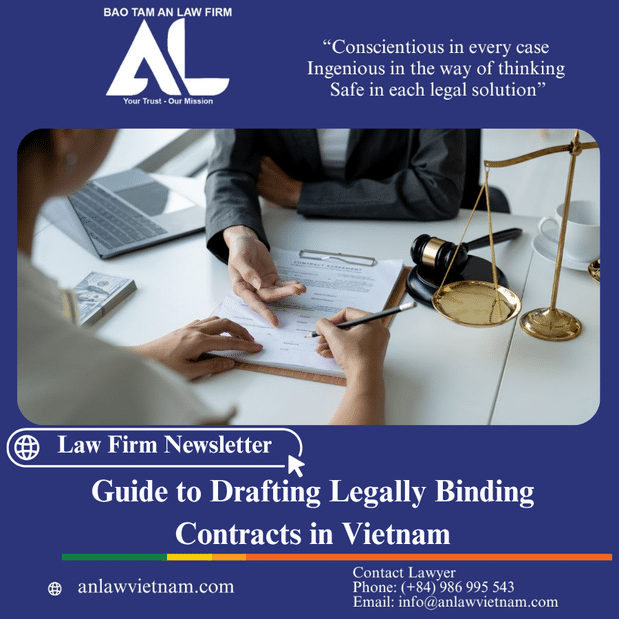Drafting Legally Binding Contracts in Vietnam
Legal Services – Drafting Legally Binding Contracts in Vietnam / An Law Vietnam
In today’s competitive business landscape, a professionally drafted and legally sound contract acts as a shield protecting your enterprise from risks and potential disputes. A contract is not merely a legal document — it defines rights, obligations, and expectations between parties, forming the foundation for transparency, trust, and sustainable cooperation.
In Vietnam, ensuring that a contract is both legally compliant and enforceable requires a deep understanding of local laws and practical drafting experience. With years of expertise advising domestic and international corporations, An Law Vietnam – a leading Vietnam contract law firm – provides tailored solutions for drafting, reviewing, and negotiating contracts that safeguard your interests and ensure compliance with Vietnamese law.
This article outlines the essential principles and steps for drafting enforceable contracts in Vietnam and explains how professional legal support can help your business minimise risks and strengthen every transaction.
What Is a Contract Under Vietnamese Law?
A contract is an agreement between two or more parties to establish, modify, or terminate civil rights and obligations. Contracts are based on the principles of voluntariness, equality, and legal compliance, and may be made in writing, verbally, or through conduct. They serve as a legal foundation to protect the legitimate interests of the contracting parties.
Key Elements of a Legally Binding Contract
- Mutual consent: Both parties agree to the terms and conditions.
- Legal rights and obligations: Contracts create, alter, or terminate civil rights and duties.
- Exchange of value: A valid contract must include consideration — money, goods, services, or other assets.
- Legality: The purpose and content must comply with the law and not violate public morality.
- Legal capacity: The parties must have full civil capacity as defined by Vietnamese law.
- Form: May be written, oral, or in another legally recognised form.
Importance of Contracts in Vietnam
- Protect the lawful rights and interests of each party.
- Serve as evidence and a legal basis in case of disputes.
- Ensure transparency and accountability in business cooperation.
Common Types of Contracts in Vietnam
Civil Contracts – Govern personal and property relations, including:
- Property sale and purchase contracts
- Lease agreements
- Service contracts
- Power of attorney agreements
- Loan agreements
Commercial or Business Contracts – Used in trade and corporate transactions:
- Sale of goods contracts
- Service supply contracts
- Construction contracts
- Processing (outsourcing) contracts
- Transport contracts
Employment Contracts – Define employer–employee relationships:
- Indefinite-term contracts: Long-term and ongoing employment.
- Fixed-term contracts: Employment for a defined period under agreed terms.
Steps to Draft a Legally Binding Contract in Vietnam
Step 1 – Define the contract’s purpose: Identify objectives, scope, and expected outcomes to ensure relevance and clarity.
Step 2 – Identify the parties: Include full legal names, addresses, tax codes, and contact details to avoid errors.
Step 3 – Draft clear and precise clauses: Describe the subject matter accurately and avoid vague wording.
Step 4 – Define rights and obligations: Specify responsibilities, timeframes, quality standards, and entitlements.
Step 5 – Include payment terms: State payment amounts, methods, deadlines, and penalties for late payment.
Step 6 – Add termination provisions: Outline notice requirements, termination conditions, and breach remedies.
Step 7 – Establish dispute resolution mechanisms: Encourage negotiation and mediation first, then arbitration or litigation if necessary. Define the governing law and jurisdiction.
Step 8 – Review and finalise: Ensure legal compliance and practical feasibility. Seek advice from a Vietnamese business contract lawyer for professional review.
Step 9 – Execute and notarise (if required): Contracts should be signed, sealed, and notarised for transactions involving property or high-value assets.
Why You Need a Lawyer for Contract Drafting
Working with a qualified Vietnam contract lawyer provides significant advantages:
- Legal assurance: Ensures the contract complies with Vietnamese law, avoiding invalidity.
- Risk management: Identifies potentially risky clauses and provides preventive strategies.
- Customisation: Tailors terms to fit your specific business and industry needs.
- Representation: Provides professional legal representation in arbitration or court proceedings.
Conclusion
Drafting a legally binding contract is one of the most important aspects of doing business in Vietnam. Proper drafting, legal compliance, and professional review help safeguard your interests, prevent disputes, and establish long-term trust with your partners.
With a team of highly experienced lawyers in commercial, civil, and corporate law, An Law Vietnam has advised leading multinational companies and local enterprises across various sectors. Our deep understanding of Vietnamese legal regulations and business culture enables us to deliver reliable, effective, and practical legal solutions.
Contact An Law Vietnam
📞 Phone: (+84) 986 995 543
📧 Email: info@anlawvietnam.com
📍 Head Office: Diamond Plaza, 34 Le Duan Street, Sai Gon Ward, Ho Chi Minh City
🏢 Vung Tau Branch: Vo Thi Sau Street, Vung Tau Ward, Ho Chi Minh City
